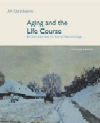1. The Alzheimer's Association (http://www.alz.org)
is the nation's largest voluntary health organization committed to finding a
cure for Alzheimer's and helping people who are afflicted with the disease.
Go to the website and link to People With Alzheimer's, then to Answers to Frequently
Asked Questions. Select "How many people are affected by Alzheimer's disease?"
and answer the following questions: - How many persons over age 85 have Alzheimer's disease?
- How many Americans have Alzheimer's disease?
- How many persons worldwide does the Alzheimer's Association estimate will
develop the disease by 2025?
- What are the warning signs of Alzheimer's disease?
- How does Alzheimer's disease progress?
2. The American Association for Geriatric Psychiatry (http://www.aagpgpa.org/default.asp)
is a national association dedicated to promoting the mental health and well-being
of older people and improving the care of those with late-life mental disorders. Go to the AAGP website and click on the heading Patients and Caregivers. Next,
click on Depression Fact Sheet. After reading the article "Late Life Depression
– a Fact Sheet," answer the following questions: - How many out of every 100 adults over age 65 in the U.S. are affected by
depression?
- Depression is particularly common in elderly patients with which diseases?
- List at least six symptoms of depression in older adults.
- Depression among older adults is often mistaken for what disease?
- How is grief distinguished from depression?
- What are some common treatments for depression among the elderly?
3. The Parkinson's Disease Foundation (http://www.pdf.org)
is a national non-profit organization dedicated to supporting and promoting
the highest quality research into the cause(s) and cure of Parkinson's disease.
From the homepage, click on "About Parkinson's Disease" and read "Parkinson's
disease: An Overview. Than answer the following questions: - What kind of disorder is Parkinson's disease, and why is the incidence of
it often underreported?
- Who is at greater risk for developing the disease?
Go back to the homepage and click on "Ask the Expert." Then click
on "Parkinson-Plus: Shy-Drager Syndrome/Multiple System Atrophy."
Read Questions 1 and 15, and the expert's answer to each. Then answer the following: - What are the symptoms of OPCA?
- Is Shy-Drager Syndrome caused by high and low blood pressure? How is it
diagnosed?
4. Dementia Caregivers' Community (http://signpostjournal.connect-2.co.uk/dementia.htm)
provides the public with information about dementia and support for a loved
one with dementia. From the homepage, scroll down to the heading, "What
is Dementia?" Read about the disease and then answer the following questions: - What is dementia?
- How many people does dementia affect, and whom does it affect the most?
- What are the different types of dementia, and what diseases can cause dementia?
- Name at least four symptoms of dementia.
| 


 2002 McGraw-Hill Higher Education
2002 McGraw-Hill Higher Education